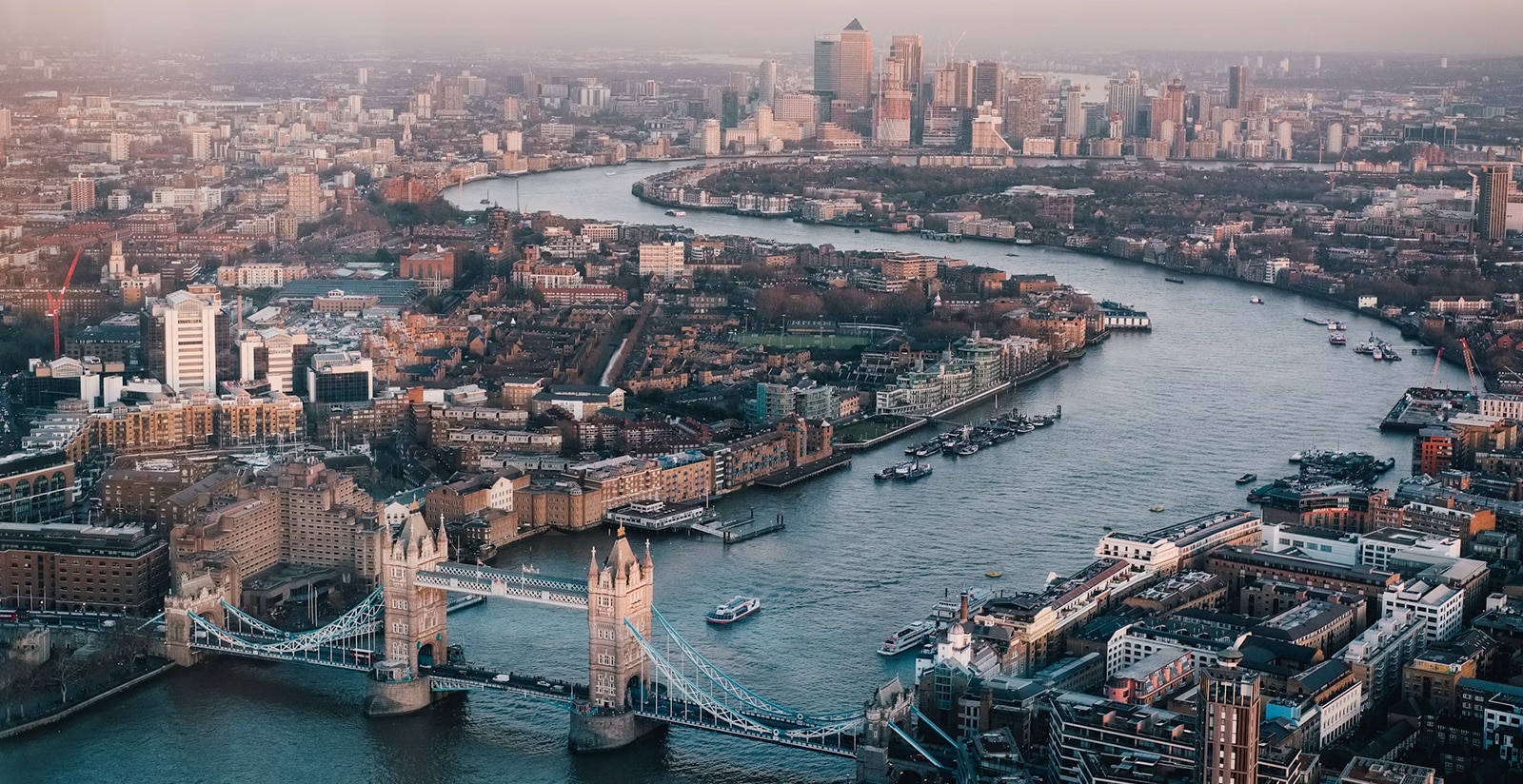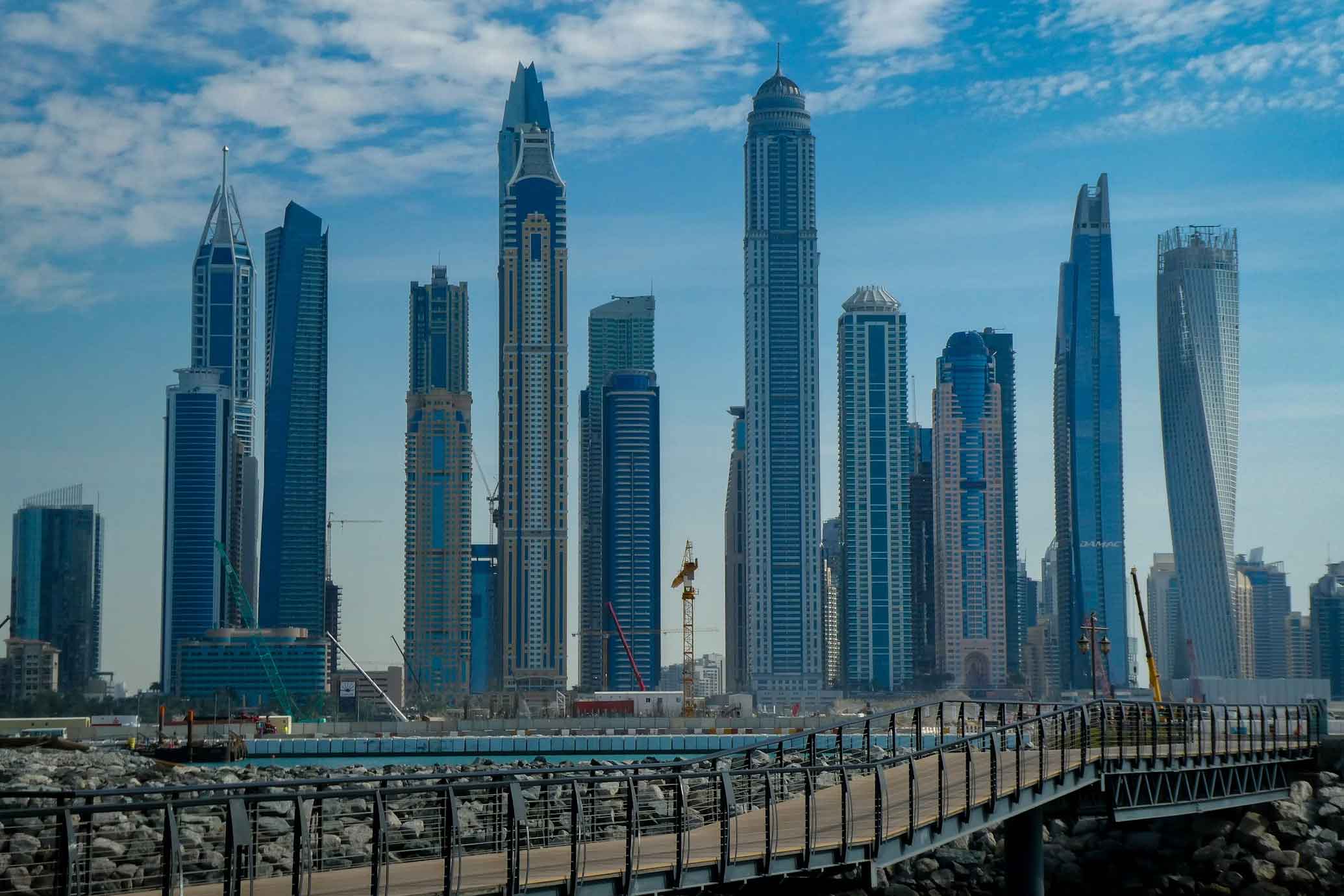Table of Contents
1) Real Estate & Rent Costs
2) Tax Obligations
3) Specialists in Permits & Licensing
4) Common Insurance Requirements
5) Powering Your Operation- Utility Costs
6) Noteable Labor Impacts
7) Regional/Cultural Variances
8) A Solid Plan is Your Map to Success
Your London restaurant is an enormous success and now you have your sights set on bringing your concept to The States. But, tourism and restaurant opportunities are high in Dubai, so your upscale-trendy menu could fare well in the growing market. Better yet, a second London location may work.
It’s a wonderful conundrum- being ready for expansion with so amazing locations to choose from for where to invest your hard earned capital. We know restaurant ownership can be risky business, so we pulled together the details you need to know about the challenges and opportunities of opening a restaurant in three of the hottest cities in the industry: New York, London, and Dubai.
We’ll take you through which New York boroughs have the highest rents and the best nightlife, why your dessert-forward menu will fare very well in Dubai, and the biggest challenge the London hospitality industry is currently facing. Read on to discover real estate watch-outs, tax and regulatory hurdles, utility costs, and cultural considerations to note on your expansion journey.
Real Estate & Rent Costs
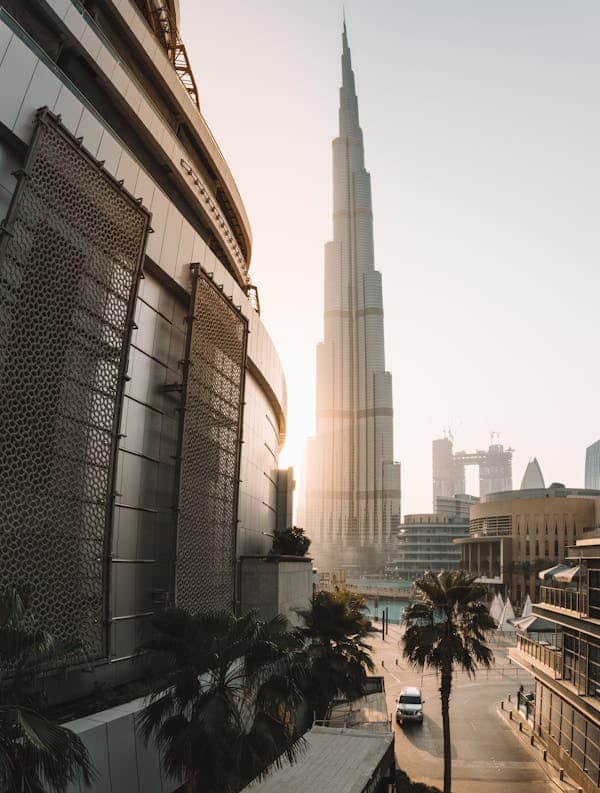
Rent and real estate costs are the third highest expense for restaurant owners, and this area is where we see the most variation from city to city. In New York, rents in Brooklyn and outer Manhattan run around $120 per square foot on average, with average rents skyrocketing toward $400 per square foot in Midtown Manhattan and Tribeca. You’re paying nearly 200% higher rates to be in the hottest locations with ideal traffic, but as we’ve reiterated throughout, this is where understanding your concept and clientele is crucial. You don’t need to spend extra to be downtown if your patrons will be evening diners looking for a laid-back atmosphere and upscale menu. You’d be better suited in Brooklyn where the average rent is much lower and the crowd is ready for your late night scene.
Spaces for rent in London cost closer to $100-$260 (£75 to £200). Though the number of available spaces might be more limited, it is certainly more affordable per square foot than New York City. Interestingly, rental costs in Dubai sit at $50- $170, depending on the location selected. Dubai real estate is also subject to turnover rent applied at an additional 15-20% per square foot.
An important note when selecting your space is that all three cities have laws that require restaurants to be accessible to patrons with disabilities. To be compliant, you may have to make adjustments such as widening entry doors or increasing facility access. Costly renovations to accommodate the requirements can really hit your budget, or worse, delay opening due to non-compliance, so consider access and spatial requirements when looking at properties.
You’ll also want to keep in mind the cost to build out your concept. Layout construction and design supply costs should be heavily considered. In New York or London you’ll have access to high end design supplies, where in the UAE, most of your supplies will be imported, resulting in higher cost and a longer timeline. Our team anticipates these costs for you when building your concept and developing your plan. They know the neighborhoods you want to be in, help negotiate competitive lease terms, and manage real estate taxes. Talk with our Real Estate team today to see how they can help you find your perfect location.
Tax Obligations
No city is immune to taxation. This area is where Paperchase Business Services experts truly shine. They know local tax codes inside and out- your go to resource to navigate complex tax laws, especially in a new city or country.
For example, London has aggressive taxation for employee income, but the employer also has hefty obligations to pay into the national insurance on behalf of the employee, as well as VAT tax on meals. That adds up to a lot of extra tax spend! New York requires taxes at the local level as well as national taxes on business activities and payroll. Dubai has the lowest tax impact of the three cities, but the VAT imposed on every step of the supply chain will certainly increase supply costs.
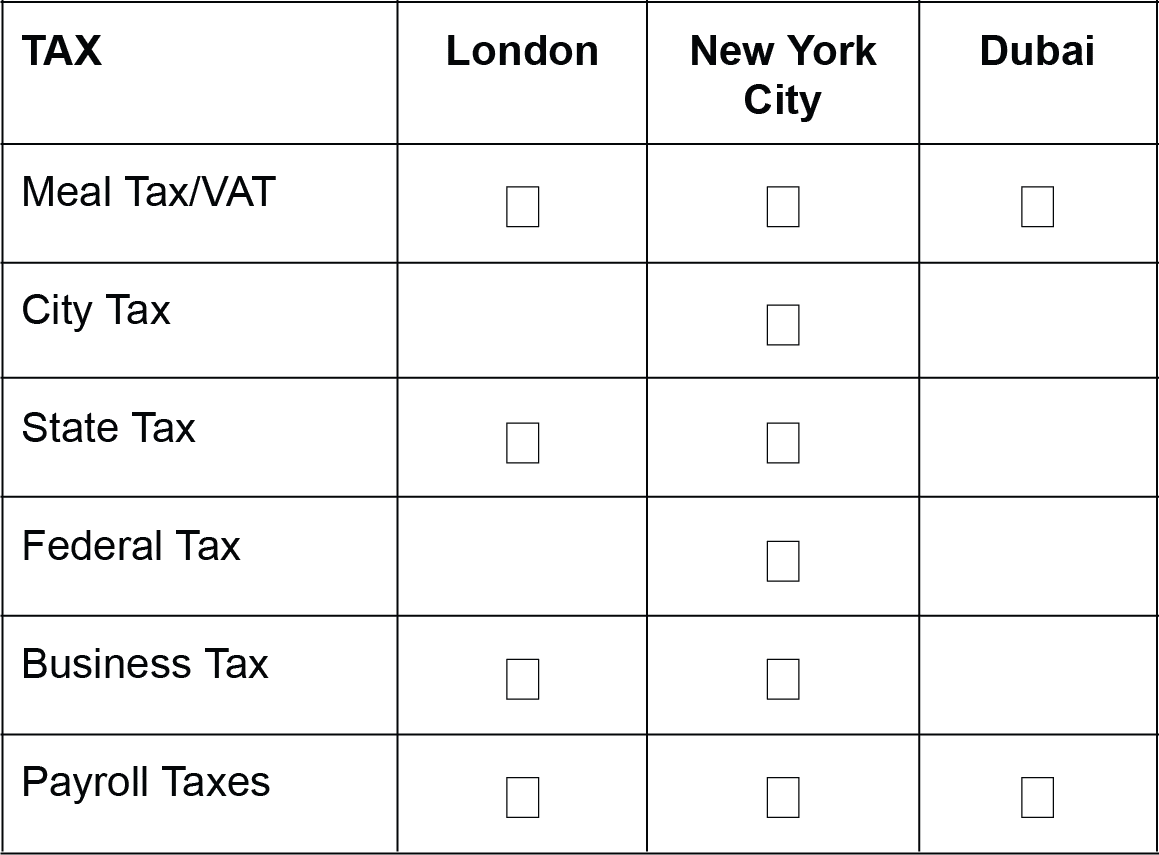
New York has a total 8.875% meal tax. A combination of New York City’s 4.5% tax on the service, New York State’s sales tax of 4% and the Metropolitan Commuter Transportation District’s tax of 0.375% for total sales, this is high in comparison to other cities nationally. And New York City imposes a Liquor Tax, which is 25% of the license cost, annually for holding a license in the City.
Dubai has a federal tax, but no individual income tax. However, a 5% VAT tax on purchases all along the supply chain will greatly drive up food and build out supply costs. The VAT is applied to the meal as well, which would be passed on to the patron. Owners will also be liable for Corporate tax on Net Income once profitable.
Employer paid Payroll taxes are another area of consideration from city to city and country to country. In the US, employers must pay into social security (6.20%), unemployment (variable by state) and medicare (1.45%).
In London, employers will pay national insurance rates at a rate of 0% to 13.8% depending on weekly pay levels. There is also an income tax on earnings and the VAT tax on meals is now back to the pre-pandemic rate of a staggering 20%.
Regardless of the city, it is imperative to work with professionals who understand the local requirements. Paperchase payroll experts file local and state taxes and process payroll, including payroll taxes, ensuring you remain compliant in this tricky area. Book a call with our expert Day-to-Day Finance team and relieve your tax headaches today.
Specialists in Permits & Licensing
A major consideration when scouting locations is the country, state, city and even neighborhood regulatory requirements. New York, for example, requires seven different licenses to be obtained before opening, all with various requirements and fees ranging from hundreds to thousands of dollars. These range from food handling and storage, to pest control, and alcohol permits.
In London, depending on the format of your restaurant, the quantity of permits required is greater than in New York. But the average cost per permit is lower than NYC, and permitting is more in line with inspections and risk analysis rather than costly licenses.
Opening a restaurant in Dubai offers a few less permitting requirements, even fewer if your concept includes Halal food only (no pork and liquor permits necessary). However, the Trade and Food Trading licenses are integral to operating a food and beverage establishment in the city. An approved application for a Food Trading License is dependent on first obtaining the Trade License, which requires an intensely thorough business plan, including the usual financial projections plus your intended legal status and nature of the business (Professional, Industrial or Commercial). You’ll also require a Local Sponsor, which can cost upwards of AED 10,000 per year($2,722),and delivery permits are extraordinarily high, while liquor permits are currently free as the region continues to grow tourism.
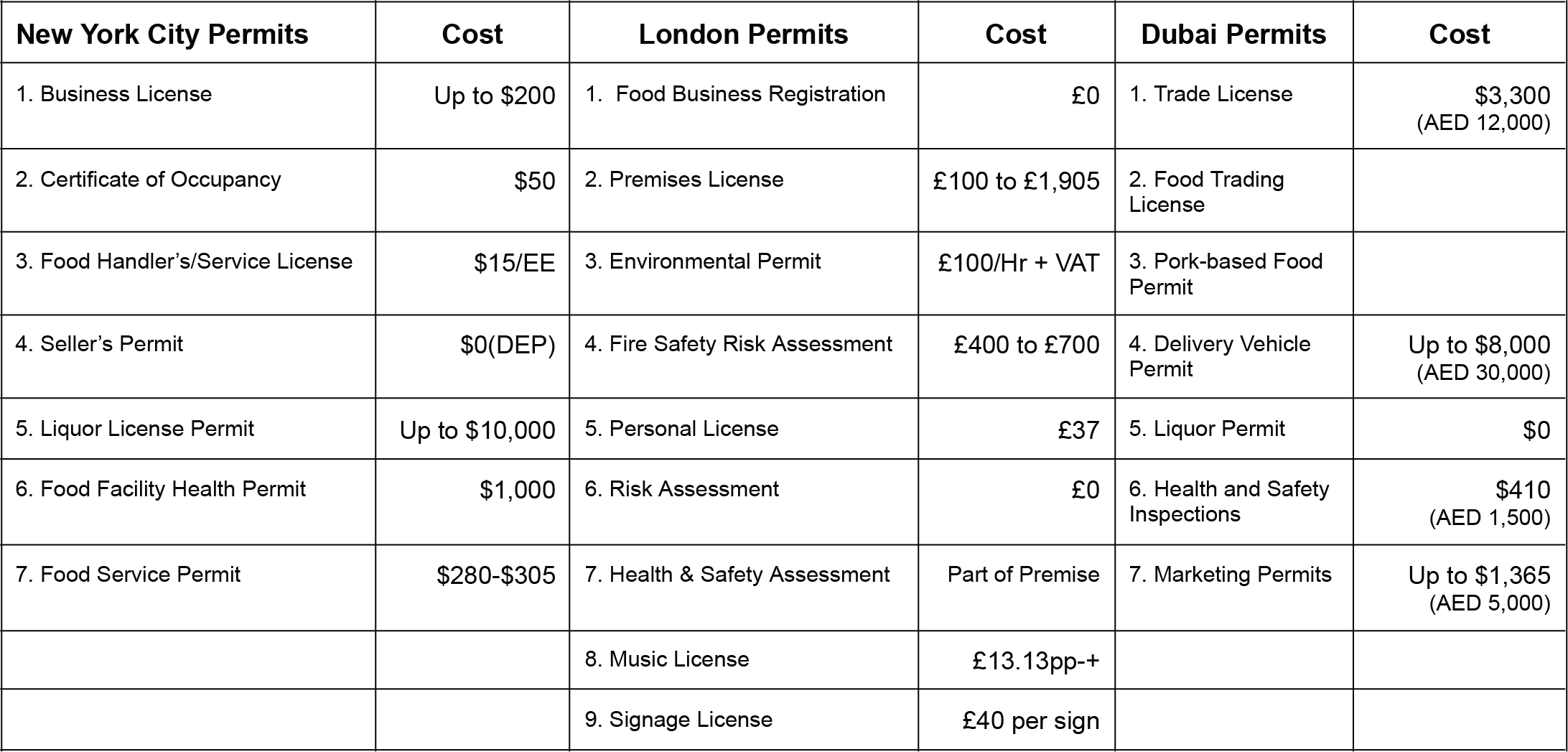
All cities also require some sort of insurance to protect from catastrophic losses and accidents. These are in addition to regional requirements for employee health insurance.Though they are not all required, similar coverages are recommended in Dubai as well as London. Each city requires specific coverage amounts, which drives the policy costs. Knowing how to navigate the complexities of each policy will save you from overspending on coverages you don’t need.
Common Insurance Requirements:
- General Liability.
- Workers’ compensation coverage.
- Commercial auto coverage.
- Food liability insurance.
- Inventory insurance.
- Alcohol liability insurance.
How terrible would it be to set your Grand Opening date only to find at the eleventh hour that you have a pending permit or a regulatory miss. Paperchase has permit and licensing specialists, as well as insurance analysts, who will assist with the entire process. From completing complicated applications and supporting documents, our specialists rescue you from dealing with a multitude of local offices and agencies and help ensure your approvals come through on time. Team up with our experts today and rest assured you will be ready to go on opening day!
Powering Your Operation- Utility Costs
Anticipating the cost of utilities can be a challenge, especially without firm details like the square footage of your space. But understanding the nuances that can impact utility costs positively and negatively can help with some of the unknown.
Major utilities, like electricity, water, gas/heating, waste removal and internet, are the most common services in restaurants. From city to city within the same country, the costs can vary greatly, but when comparing cities in various countries, it’s helpful to understand some of the nuances of the area to better anticipate the costs. Our expert hospitality accountants know the benchmarks for each region. In addition to adding valuable feedback on cost estimates during planning, they will audit your utility bills to ensure you are not overcharged once operations commence.
They know that in New York City, utilities can run up to 4% of revenue. Most services are readily available and not as expensive as other cities, such as waterfront locations, but you should consider budgeting for a significant increase in cooling in the summer and heating in the winter as the region can experience extreme changes in temperature.
London boasts relatively low utility costs at £3,000 to £5,000/mo and are generally reliable. Keep in mind, however, that retail spaces could be aged and require significant upgrades. You also must keep diligent records of waste removal for inspection. The UK energy regulator has just recently announced that the the energy price cap will increase by 10% from 1st October to 31st December 2024, with another likely increase when they review the price cap again for January quarter.
Opportunity for new businesses is great but still developing in Dubai, so you’ll find the highest risk of variation in this city. The cost of water and electricity may be low on average. However, depending on your selected location, the available utility volume may not be what your restaurant requires. Our team will help ensure that the utility source can handle adding another high-usage business, especially in the highest temperature seasons when enormous volumes of electricity will be needed to keep water, food and buildings cold. Once you are up and running, the Day-to-Day Financials team will identify and deploy creative tactics to control utility costs, continue to monitor bills for accuracy, and feedback on any savings opportunities. Reach out to Sales today to engage this expert team today!
Noteable Labor Impacts
Labor Staffing & Costs – elements that can impact your business dramatically regardless of how well you plan. At Paperchase, we bring the expertise to your labor planning and payroll management. From weekly payroll calculations to CRT tax and Spread of Hours for NY, we have a scalable team that goes above and beyond weekly payroll processing. They understand the distinct requirements of the industry and use their expertise to not only maintain compliance,but to deliver valuable feedback on cost control.
We discuss costs and nuances for each city below, but a wide-spread issue with labor planning in the restaurant business is the decrease in available workers. The younger workforce sees the industry as less desirable compared to other industries despite the fact that it is still a great way to make a living. To attract talented staff and maintain a high level of service, you’ll want to set up a training system that can be easily managed from the top down and foster an environment where workers feel valued and have opportunities to grow.
In UAE cities like Dubai, will need to provide skilled workers with housing, or offer additional compensation to cover living expenses. There are no minimum wages set in Dubai, but you will want to be competitive to attract top chefs and talent to your restaurant.
New York City and London both have minimum wage laws. In London, the minimum wage per hour is $15.00 (£11.44) for over 21 years old. Service/tipped workers are entitled to the same minimum, but this city has had a harder time getting younger workers to join the industry, but offering a competitive wage could mitigate that challenge. The State of New York has a minimum wage of $16.00 per hour, but at least $10.65 for tipped food workers, plus a $5.35 tip charge. NYC is also plagued with shortages in the industry, but with a higher population needing work, the pool should be larger.
Paid time off varies greatly between the three cities as well. In the UK, it is customary to earn paid time off, or Holiday Pay, at a high rate. Even part time workers earn the mandatory 5.6 weeks of time off. This is a huge difference between London and New York. New York has a state mandate of earning at least 40 hours of sick leave, but most states do not mandate general time off. Instead, vacation and paid time off is set industry to industry and company to company. Even Federal and State holidays are not standard. Dubai lands closer to the UK tradition with thirty days off annual leave available after working for a year, with 14 official holidays.
Traditional holidays and high travel times for annual leave should be taken into consideration for labor expense planning, but also for establishing schedules and operating days. Our Day-to-Day Financials team understands these traditions and will be your partner from concept to labor planning and beyond. See how they’ve helped other owners like you here.
Regional/Cultural Variances
We know how important it is to align your concept with the local consumer tastes and culture. Our team understands that New York City’s five boroughs each have a unique personality with extremely different patrons and schedules. Manhattan, for example, hosts over 1.5 million workers per day, nearly 60% of which commute from other cities and boroughs. That means that restaurants in the downtown area lose 60% of their potential clients when the work day ends. If your concept includes hosting well-off business crowds, then tailoring your menu and reservations for 8pm-11pm isn’t the best idea. In contrast, that late dining concept would perform well in trendy Soho or Williamsburg where people look to go out after they’ve had a chance to return home and settle before heading to dinner.
Will people walk, drive or take the subway? Is there ample parking or driver services for late night? These are especially important in London where, like NYC, the population rises significantly during the work day, but the profile is largely international. Reservations are highest between 6pm and 9pm and most restaurants stop serving food by 10pm, but London has a strong lunch crowd in many neighborhoods. Patrons like their traditional dishes, like Scotch Eggs and Fish & Chips, but also have a healthy appetite for high end and international cuisine.
In the US, average food portions are larger compared to global cities like London. This is important to note because your London or Dubai concept of beautifully tiny portions will be seen as overpriced to US patrons. We’ve seen owners hold firm on their small plate menu from the UK when opening a US location, only to close because they were unwilling to shift their menu to satisfy the local preferences. You don’t have to change your entire concept, but you want to make sure you understand your customer and adapt your menu accordingly. For instance, Dubai customers are more likely to order dessert, so showcasing your delectable post-meal menu will keep your patrons happy, and increase your average ticket spend!
Climate is a major consideration in Dubai as well. Average temperatures linger around 70℉/27℃for half of the year. The other half averages in the 90’s and well over 100℉/38℃. The summers are hot! Restaurant owners see a huge spike in electrical costs and a dramatic drop in ticket numbers as locals leave the area for annual leave. It is undesirable to walk several blocks in high temperatures in shorts and a tee shirt, so patrons who take pride in traditional dress will not frequent a restaurant that does not have close parking.
A Solid Plan is Your Map to Success
There’s no way to sugar coat it. A robust business plan will be your map on the windy road to grand opening. It starts with your concept, but our Growth & Development team will help build out that plan and bring it to life.
First, your business should reflect the profile of your patron – their tastes, schedules, typical budget for dining out. Standard items like financial projections and marketing strategy will be included, but a key component is the location and strong understanding of the local requirements and culture.
The licensing applications in London, New York City and Dubai all require your business plan when applying for permits and licenses. Governing agencies want to feel confident that a new restaurant has an intentional plan that includes knowledge about the area’s traditions and people, assurance that you intend to stay for an extended number of years, and how you plan to contribute to the local community.
Our Corporate Finance department can help you build a robust business plan including funding plans, pitch decks and valuations. Paperchase will advise you from concept through leasing and contracts, identifying benchmarks and ensuring compliance every step of the way. We are your regional guide for a strong start and sustainable long term growth – your global partner from inception through operation.
Major areas to cover in your restaurant business plan are:
Executive Summary
Concept Overview
Financial Projections- (1-3 & 5 year)
- Start Up/Investment
- Break Even Analysis
- Cash Flow Analysis
Cash Flow Analysis
Operating Plan
Market Analysis
Marketing Strategy & Plan
Expansion Plans
Community Involvement
The restaurant industry is ripe with opportunities for hot new establishments in major cities around the world – each offering unique guests and distinct rules, regulations and processes that must be followed for smooth opening and operation. Regardless of what city you choose for your next hot restaurant, the key to success is studying the area, understanding the requirements and anticipating the costs to ensure your plan is as solid as it can possibly be.
With your Global management team in place, you will need a global accounting team that can guide you in your expansion and open new doors. Paperchase experts advise in all of these areas and will be your partner for growth in your restaurant, and around the world.
Read more
